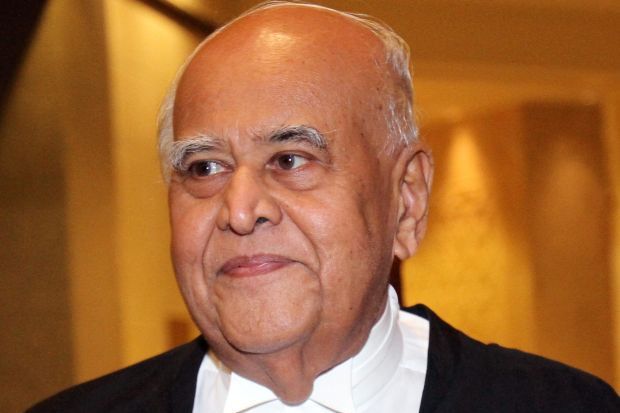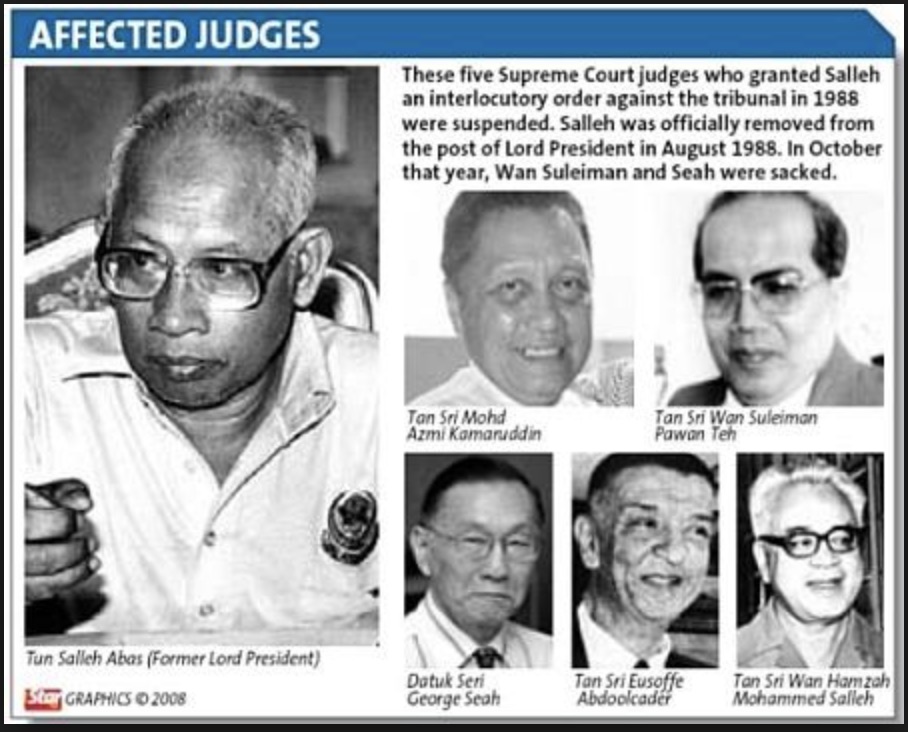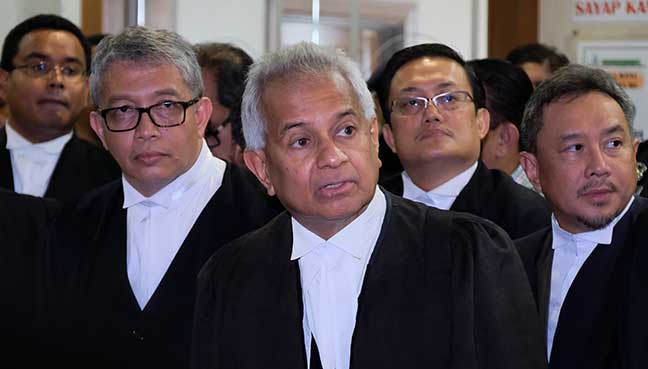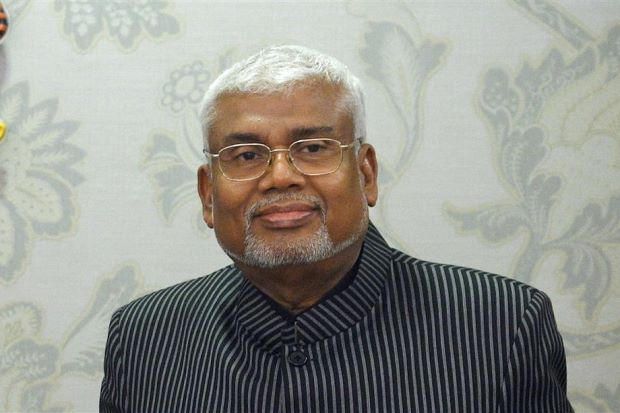As I said ten years ago: the Malaysian judiciary is corrupt

It is said the only way to get to the top of the judiciary is to be crooked. If not you will end up like the Budak Kolet or like Tun Salleh Abas and a number of other highly qualified and principled judges (such as Azmi Kamaruddin, Eusoffe Abdoolcader, Wan Hamzah Mohamed Salleh, Wan Suleiman Pawanteh, George Seah, etc.) who suffered because they were too Shariah-Compliant and not Umno-Compliant enough.
NO HOLDS BARRED
Raja Petra Kamarudin
When I made the decision to leave Malaysia ten years ago in 2009 (I left on Saturday, 21st February 2009), it was precisely because I had no confidence in Malaysia’s judiciary and knew that my case was being rigged by the five Federal Court judges. Even my team of lawyers were frustrated by the ‘unorthodox’ ruling of the judges, who even a first-year law student could notice were ‘funny’ decisions.
Anyway, what I said ten years ago has finally come to light (READ THE NEWS REPORT BELOW). Malaysia’s judiciary is corrupt. And those judges who do not ‘toe the line’ and ‘follow orders from the top’ are sent into cold storage and will see their careers end.
I know one judge who should have made Chief Justice but instead he saw his career end because he ‘could not be controlled’. I will not mention his name but he is an ‘old boy’ of the Malay College Kuala Kangsar (MCKK). Hence Budak Kolet will know who I am talking about.
One former judge who, according to a partner of Sri Ram & Co., can be ‘compromised’ is Gopal Sri Ram. I was told this back in 1998 and that came as a surprise because the way Sri Ram talked and acted was as if he is a Pak Lebai. Apparently, though, he is also bent or else how could he have made it all the way to the top.

You need to be Umno-Compliant and not Shariah-Compliant to get to the top
It is said the only way to get to the top of the judiciary is to be crooked. If not you will end up like the Budak Kolet or like Tun Salleh Abas and a number of other highly qualified and principled judges (such as Azmi Kamaruddin, Eusoffe Abdoolcader, Wan Hamzah Mohamed Salleh, Wan Suleiman Pawanteh, George Seah, etc.) who suffered because they were too Shariah-Compliant and not Umno-Compliant enough.
I suppose if you want to be where Gopal Sri Ram (or Tommy Thomas) is today you really have no choice but to ‘toe the line’ and become Umno-Compliant (or in this case Umno-2.0-Compliant). That is the price you pay to be successful in Malaysia.
Now, what was that again about Pakatan Harapan’s ‘New Malaysia’ where it is out with the old and in with the new? Or is this merely a case of same shit different day?
**************************************************
Two of ‘ISA7’ file police report on Hamid Sultan’s affidavit
(MMO) – Two men formerly convicted of illegal assembly while protesting in 2001 against the Internal Security Act (ISA) 1960 today lodged separate police reports over Court of Appeal judge Datuk Hamid Sultan Abu Backer’s affidavit.
Rafzan Ramli, 42, and Khairul Amal Mahmud, 38, want the police to investigate Hamid Sultan’s allegations regarding the way in which the Court of Appeal decided their case.
“Our purpose in filing the police report is to investigate the affidavit of Court of Appeal judge Hamid Sultan.
“If it’s true that there were wrongdoings that occurred, it will affect our cases, so I ask that it be investigated,” he said after lodging his police report at the Petaling Jaya district police headquarters here.
Rafzan and Khairul were among seven university students then who became known as the “ISA 7”, and who were charged on July 19, 2001 with unlawful assembly on June 8 the same year at the compound of the National Mosque over their failure to obtain a police permit for the gathering.
While a Magistrate’s Court initially acquitted the seven in April 2005, the case was later sent back for trial by the High Court in November 2006 following the prosecution’s appeal.
On June 18, 2009, the Magistrate’s Court convicted five of them, fining them each RM3,900 in default of three months’ jail.

The non-Umno-Compliant judges who suffered at the hands of the Prime Minister
The five then appealed against their conviction to the High Court but lost in January 2011.
They then filed an appeal to the Court of Appeal to challenge the constitutionality of the law they were convicted under.
But on September 4, 2013, the Court of Appeal dismissed this in a 2-1 decision.
Michael Cheah, a lawyer for the duo, noted that one of the judges who had heard the case at the Court of Appeal had made allegations about “the manner in which the particular appeal was decided”.
“The allegations are serious. They warrant a thorough investigation; and a review of the decision in the appeal,” he told reporters here after accompanying the duo to lodge a police report.
Hamid Sultan was one of the three judges at the Court of Appeal who heard the case involving five of the “ISA 7”.
In his 63-page affidavit, Hamid Sultan had made references to the case, as well as made allegations regarding how the majority judgment was reached.
The majority judgment saw two judges ruling that Section 27(2) and Section 27(5) of the Police Act — which makes it an offence to take part in a gathering without a police permit — were not against the right to freedom of peaceful assembly under the Federal Constitution’s Article 10(1)(b).

You cannot make it this far by being honest
Hamid Sultan had written a dissenting judgment in which he disagreed with the other two Court of Appeal judges, deciding that the Section 27 provisions were unconstitutional.
Hamid Sultan also decided in his minority judgment that the conviction of the five should be quashed and the fines that they had paid should be refunded.
Section 27 of the Police Act has been repealed and replaced with the Peaceful Assembly Act 2012 that does not require a police permit for peaceful assemblies, while ISA which the university students were protesting against was abolished in July 2012.
Joshua Tay, another lawyer representing the duo, noted that the affidavit by Hamid Sultan may have cast doubt on the “correctness or propriety” of the Court of Appeal decision that upheld their conviction.
“So I think as a matter of justice and as a matter of principle we will of course file a review and we would like to reopen the case and see whether the decision of the Court of Appeal was correct,” he said.
“Because we have exhausted all the appeals, so the only avenue left is to file a review in the Court of Appeal to review its previous decision,” he later added, adding that it would be filed in the coming weeks.
Tay explained that the five could not appeal to the Federal Court, as the highest court for appeal for cases that originate at the Magistrate’s Court was at the Court of Appeal.
The government has said a Royal Commission of Inquiry (RCI) will be formed to probe the allegations made in Hamid Sultan’s affidavit.
The lost chance
The duo who lodged the police report today never got the chance to complete their studies at the universities they were first enrolled in.
Khairul, 38, was a second-year student pursuing a Bachelor of Science degree at Universiti Malaya when his legal battles started.
“The university did not say ‘expel’, it said ‘digantung sehingga diberitahu’ (suspended until further notice),” said Khairul, who had subsequently obtained a diploma from another institution and is now working as a freelancer.
“I can say that my life is not as easy as those who were able to continue their studies,” he added.
Rafzan similarly said he was not expelled from Universiti Teknologi MARA (UiTM) as a second-year student pursuing a degree in electrical engineering, but was suspended indefinitely.
Rafzan later completed his degree in electrical engineering in another university and is now an electrician.
Their police reports were not shown to the media due to a Federal Court’s January 2019 ruling that the person who reveals the contents of a police report could be later held accountable for defamation.


